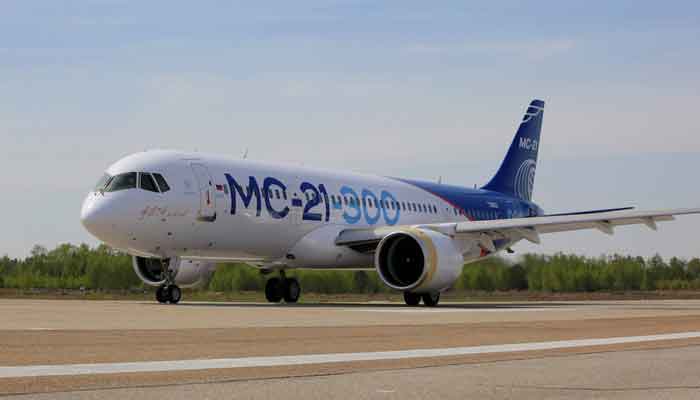MC-21: Russia challenges Boeing and Airbus with new passenger plane
Putin lauded Russia’s aircraft builders and their "unique traditions" which permit the country to "remain among the flagships of the global aerospace industry" and produce "breakthrough projects" such as the MC-21 and Mi-38 and Ka-62 helicopters.
ZHUKOVSKY: Russia is set to unveil on Wednesday its new passenger plane MC-21, billed as a competitor to Boeing and Airbus even as the project is overshadowed by sanctions and setbacks with its predecessor, the Superjet.
President Vladimir Putin formally opened the MAKS air salon outside Moscow Tuesday with Turkish counterpart Recep Tayyip Erdogan, who was enticed with Sukhoi fighter jets and treated to ice-cream as demonstration squadrons roared overhead.
The showpiece of this year’s MAKS is the new civilian aircraft, which will be formally shown to potential clients after more than a decade in the making and multiple delays.
Putin lauded Russia’s aircraft builders and their "unique traditions" which permit the country to "remain among the flagships of the global aerospace industry" and produce "breakthrough projects" such as the MC-21 and Mi-38 and Ka-62 helicopters.
The salon is the first since Russia’s United Aircraft Corporation (UAC), a conglomerate of the country’s main civilian and military aircraft makers, was put in the hands of state-owned corporation Rostec last year.
The handover, to be formally completed next year, was billed as a way to steer the industry toward more streamlined management and kindle new airplane projects.
Russia will also showcase for the first time its Su-57 fighter on Wednesday.
- Wings clipped by sanctions -
The medium-haul MC-21, which is produced by Siberian-based manufacturer Irkut and seats up to 211 passengers, is the industry’s big hope after setbacks with the regional Sukhoi Superjet 100 liner, launched in 2011 as the first post-Soviet civilian airplane.
"MC-21 is a modern, improved mid-range plane, which is set to compete on the market with Airbus 320 and Boeing 737," said Oleg Panteleyev, an aviation analyst who heads industry website Aviaport.ru.
An MC-21 prototype made its maiden flight in 2017 but serial manufacturing has been delayed, in part due to US sanctions affecting the production of its carbon composite wings.
Though it was supposed to be put in service at the end of 2018, Rostec chief Sergei Chemezov said this year the first MC-21 planes will be delivered to Russian state-owned Aeroflot airline only in 2021.
The domestically-made composite material needed to go through testing, but "in the nearest future we will start making the wing and testing it on the plane", Chemezov said in May.
The first batch of MC-21 aircraft were also to be equipped with US-made Pratt & Whitney engines, according to a contract signed before the sanctions blocked further deliveries.
The three variants on show at Wednesday’s salon use the American engines, while future production will use Russian-made PD-14 engines.
Sanctions against Moscow, gradually introduced since 2014, when Russia annexed Crimea from Ukraine, have hit several Russian industries, and Rostec and Chemezov were put on the US Treasury’s sectoral sanctions blacklists.
- Buyer ‘fears’ -
While military aircraft makers are financially supported by the Russian airforce, which has been ordering new planes in recent years, the main hurdle for Russia-made civilian aircraft has to do with finding foreign clients, said Panteleyev.
"They have to compete with foreign manufacturers which have much larger scope for promoting their planes," he said.
Russia’s previous, much-lauded Superjet was initially well-received but many clients later backed out due to difficulty in servicing it and getting parts replaced.
Several accidents also contributed to a poor image for the plane, most recently in May, when 41 people died in a fire after crash landing with full fuel tanks in Moscow. The investigation into the accident is ongoing.
Superjet had minor problems that could be fixed by continued investment, but "because so few planes were sold, they can’t get enough money from turnover for these works", Panteleyev said.
At the outset, Superjet had targeted 20 percent of the market for regional planes, but is now mostly used by state-owned Aeroflot.
"Everyone is aware there is a risk" of the shadow of Superjet’s troubles falling on the MC-21, Panteleyev said.
"They will do everything possible to soothe the fears of potential buyers."
-
Bitcoin crashes below $63K as regulatory pressure and market fears grow
-
Bitwise Crypto Industry innovators ETF: What investors should do in 2026?
-
Nintendo shares slide again as momentum fears grow
-
Gold, silver prices fallen sharply; What’s driving the drop?
-
Gold’s record climb: Experts question if its safety is ‘overstated’
-
Dubai unveils plans to construct street built with real gold
-
Netflix slams Paramount’s bid: 'Doesn't pass sniff test’ as Warner battle escalates
-
Ubisoft: Shares plunge amid restructuring plan and wave of games cancellations












